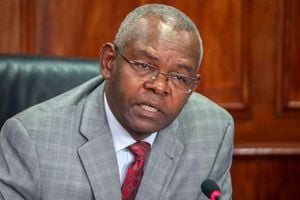
The Central Bank of Kenya headquarters in Nairobi in this picture taken on March 31, 2024.
The National Assembly has demanded certified documents showing how the Central Bank of Kenya(CBK) awarded a Sh14.10billion ($109,422,740) five-year deal to Germany’s Giesecke+Devrient Currency Technologies GmbH (G+D) to print Kenya’s new currency notes.
The Finance and National Planning Committee of the National Assembly wants the documents tabled before a scheduled meeting with CBK Governor Kamau Thugge on Thursday this week.
National Assembly Senior Deputy Clerk Jeremiah Ndombi, on behalf of the House Clerk Samuel Njoroge, has notified Dr Thugge to provide paperwork on the deal ahead of the meeting with the committee.
“The committee received a brief on the onboarding through a classified procurement process of the company to print the new Kenya currency notes. During the meeting, which you attended, the committee requested additional documents, which you are required to provide,” Mr Ndombi said in a letter to the CBK boss dated August 30, 2024.
Dr Thugge last month told the National Assembly’s Finance and National Planning Committee that G+D was picked through a classified procurement process amid risks of a stock out of bank notes which would have had grave economic and security implications for the country.
He claimed that the CBK embarked on sourcing a new currency printer after British printing firm De La Rue made a business decision to close down its printing firm in Nairobi’s Ruaraka area.
“The plant was owned by DLR, with the government of Kenya through the National Treasury, acquiring a 40 percent stake in De La Rue Kenya EPZ Limited, a Joint Venture with DLR in 2017. This company printed the 2019 series of Kenyan banknotes until January 2023,” Dr Thugge said.
“Around mid-2023, CBK determined that the country was at risk of a stock out of currency banknotes. A stockout has significant economic and national security risks. A stock out of the Sh1,000 notes was looming,” the Governor said.
British printer De La Rue – in which the government owns a 40 percent stake— shut down its operations in Kenya for lack of new orders. De La Rue wound up its currency printing operations in Kenya in the financial year that ended March 2023 and spent £15.1 million (Sh2.48 billion) to lay off over 300 workers, pay lawyers, and write off its assets.
Dr Thugge is now required to present a copy of the communication from De La Rue Kenya Limited notifying CBK of the intention to halt operations in Kenya.
Also required is a copy of the report from the user department showing the status of the currency notes presented to the board, certified copies of CBK board minutes that authorized the procurement process, and a copy of the signed five-year contract.
“You are invited to produce the documents and respond to issues that will be raised by members during the meeting with the committee,” the summons to the CBK boss further read.
CBK revealed that under the five-year contract, Kenya will receive 2.04 billion banknotes to replace those that are torn, worn out, or destroyed.
Paul Wanyeki, the Director for Currency at the CBK revealed that the country would over the five-year contract receive 460 million, 50-shilling banknotes and 690 million, Sh100-shilling banknotes.
He said Kenya will also receive 260 million, 200-shilling notes, 170 million, 500-shilling notes, and 460 million banknotes of Sh1,000 denominations. The CBK said Sh1,000 new banknotes with enhanced security features are already in circulation.







